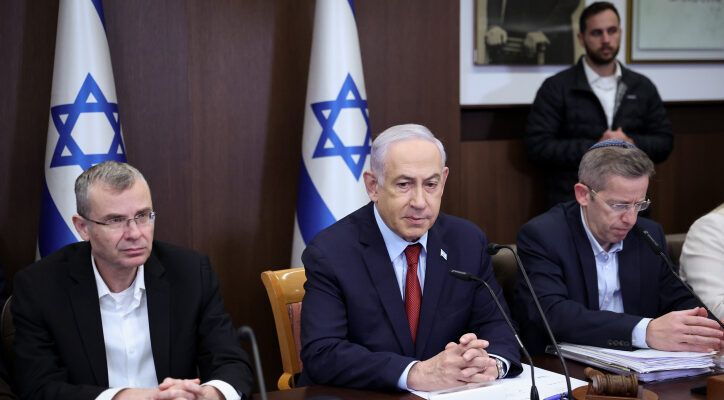After imposing ban on Al Jazeera, Israeli government votes to bar pro-Hezbollah channel from Lebanon from operating in Israel.
By Pesach Benson, TPS
The Israeli government approved on Sunday a plan to block Al-Mayadeen News, a pro-Hezbollah Lebanese TV station operating in Israel.
The plan, initiated by Communications Minister Shlomo Karhi, would block Al-Mayadeen websites and confiscate its equipment.
The Beirut-based station drew Israeli attention in July in the aftermath of Hezbollah’s deadly rocket attack in Majdal Shams where 12 children were killed on a soccer field.
Reporting from the soccer field the day after the deadly attack, reporter Hanaa Mahamid, claimed on the air that the children were killed in “an Israeli attack,” and insisted that Majdal Shams residents were skeptical that the rocket had been fired by Hezbollah. Mahamid referred to the area as “the occupied Syrian Golan” and described the town’s mood as “a scene of resistance to the occupation.”
Mahamid is an Israeli-Arab citizen and resident of Tira. It is believed that she broadcasted herself in Majdal Shams through her phone.
The ban on Al-Mayadeen is being enforced under the terms of the “Al-Jazeera Law,” which allows Israel to temporarily end the operations of news services deemed harmful to national security, including revoking press credentials, confiscating transmitters and blocking websites. The shutdown is not permanent but is subject to renewal every 45 days. The Knesset is currently advancing legislation that would extend the ban to renewable 90-day intervals.
The law is known as the Al Jazeera Law because it was first applied to the Qatari news station.
Efforts to ban Al Jazeera gained momentum in February after reporter Mohamed Washah was exposed as a Hamas commander. Soldiers recovered his laptop in northern Gaza and discovered he played a prominent role in the terror group’s anti-armor missile systems. In October, Al Jazeera was accused of endangering Israeli soldiers by exposing details of where forces were assembling, prompting the Cabinet to approve emergency regulations to temporarily shut down Al Jazeera operations in Israel.
The Tel Aviv District Court in July accepted the state’s request to ban the Qatari network, saying its broadcasts were “a real violation of state security.”
Hamas computer files subsequently seized by the Israeli military also confirmed that Al Jazeera reporter Ismail al-Ghoul was a member of the terror group.
At least 1,200 people were killed, and 252 Israelis and foreigners were taken hostage in Hamas’s attacks on Israeli communities near the Gaza border on October 7. Of the 111 remaining hostages, 39 have been declared dead. Hamas has also been holding captive two Israeli civilians since 2014 and 2015, and the bodies of two soldiers killed in 2014.
Nearly 80,000 Israelis were forced to evacuate their homes near the Lebanon border when Hezbollah began launching rockets and drones in October. Hezbollah leaders have said they will continue the attacks to prevent Israelis from returning to their homes. The attacks have killed 26 civilians and 18 soldiers.
Israeli officials have been calling for Hezbollah to be disarmed and removed from southern Lebanon in accordance with UN Security Council resolution 1701, which ended the 2006 Second Lebanon War.





